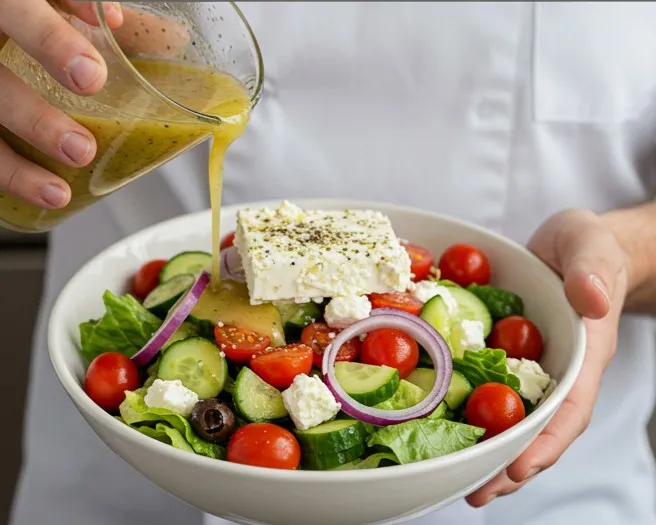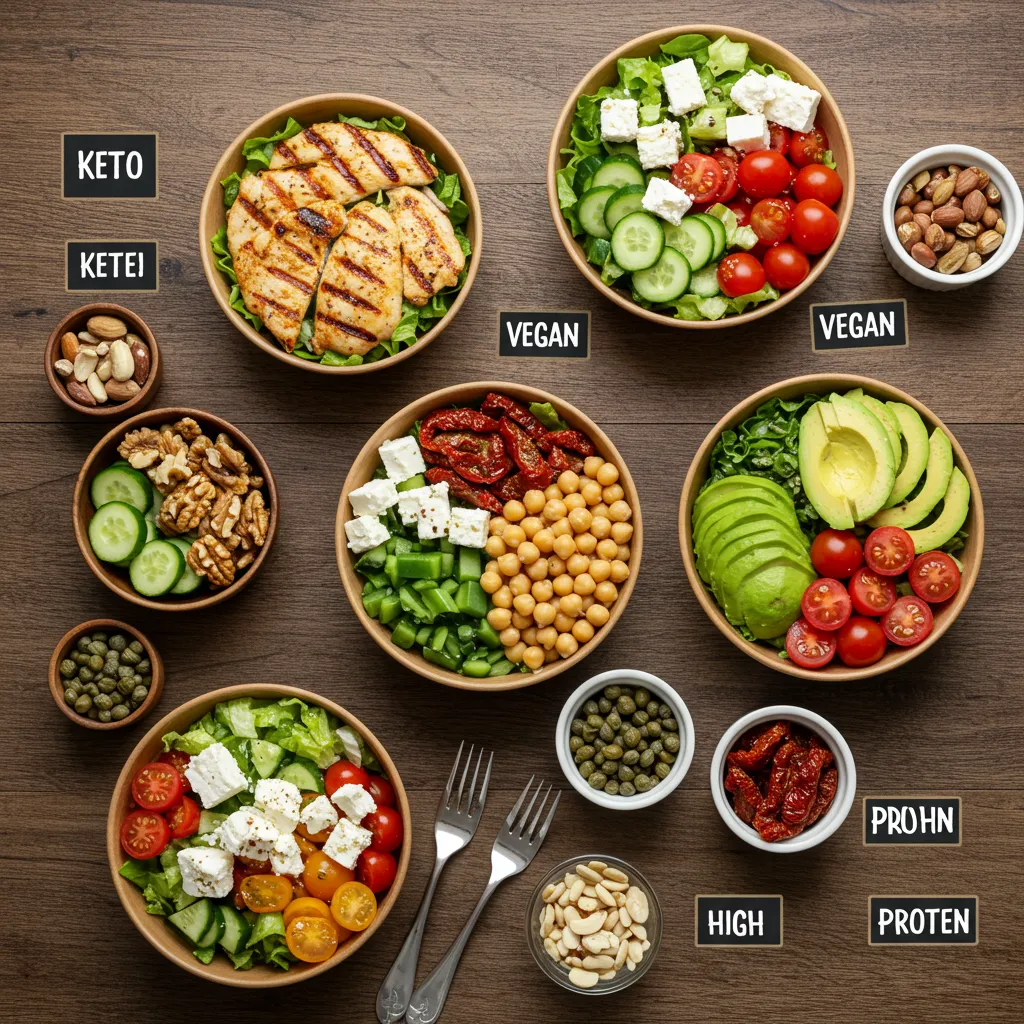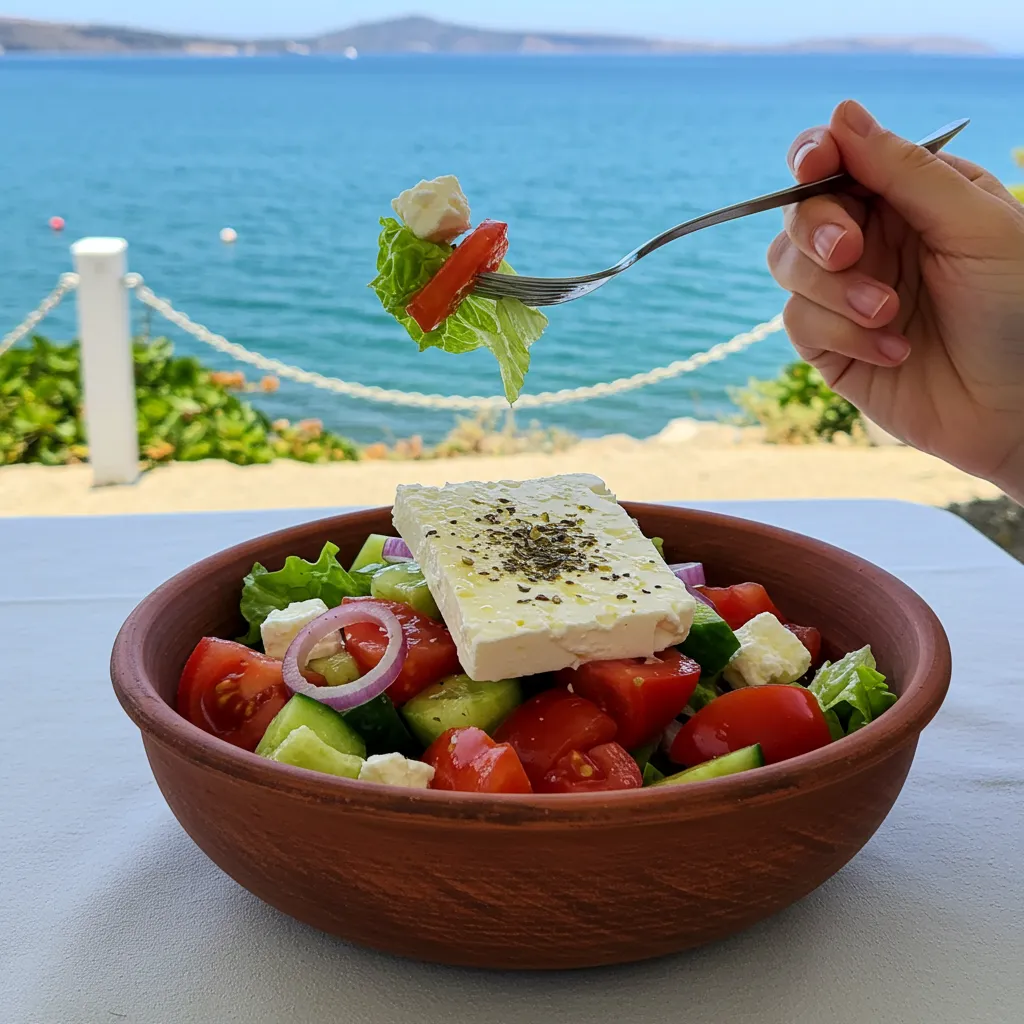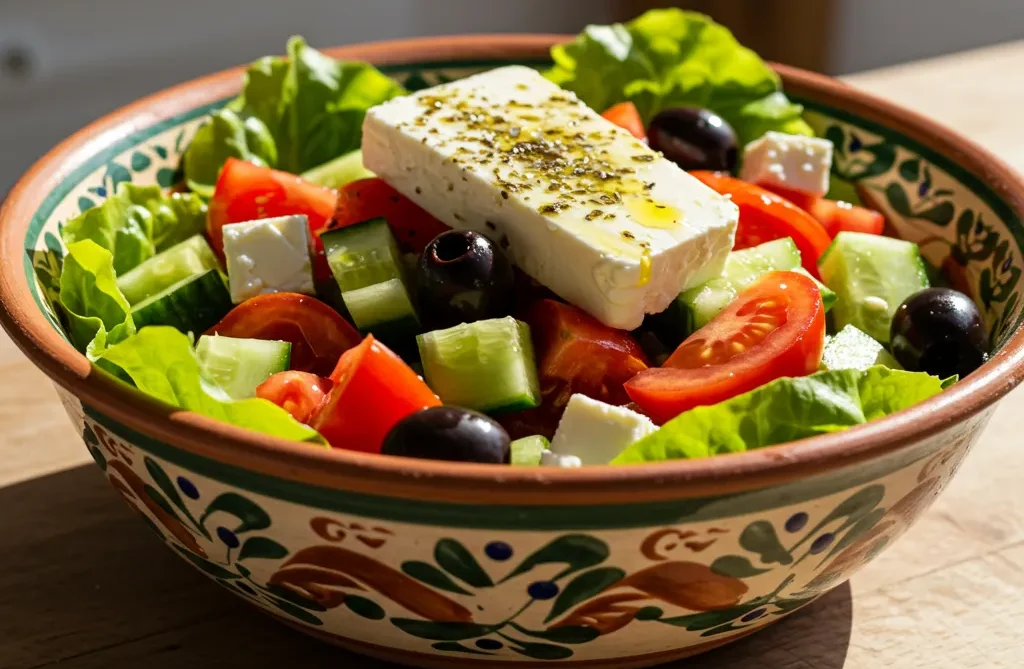Picture this: a warm summer evening, a table filled with vibrant Mediterranean dishes, and at the center—a crisp, refreshing Greek salad. This simple yet bold dish has been a staple in Greek cuisine for generations, offering a perfect balance of flavors and textures.
Greek salad, also known as Horiatiki, is a celebration of fresh ingredients. Juicy tomatoes, crisp cucumbers, and tangy feta cheese come together with briny Kalamata olives and a drizzle of extra virgin olive oil. It’s a dish that requires no complicated techniques, just high-quality ingredients and a few minutes of preparation.
What sets this salad apart is its incredible versatility. Enjoy it as a crisp side with grilled meats, a refreshing standalone lunch, or turn it into a filling meal by adding your favorite protein. Whether you’re hosting a dinner party or preparing a quick weekday meal, Greek salad is always a great choice.
In this recipe, you’ll discover the authentic way to make Greek salad, along with tips for customizing it to suit your taste. Let’s dive in and create a dish that brings a taste of the Mediterranean to your table.
Print
Greek Salad – A Refreshing Mediterranean Classic
- Total Time: 10 minutes
- Yield: 4 servings
- Diet: Vegetarian
Description
This authentic Greek salad is a fresh and flavorful Mediterranean dish, featuring juicy tomatoes, crisp cucumbers, red onions, Kalamata olives, and creamy feta cheese. Tossed in a simple yet delicious olive oil and red wine vinegar dressing, it’s a perfect light meal or side dish. This salad is naturally gluten-free, vegetarian, and packed with nutrients, making it a healthy and satisfying option for any occasion.
Ingredients
For the Salad
- 4 ripe tomatoes, cut into wedges
- 1 cucumber, sliced into half-moons
- ½ red onion, thinly sliced
- ½ cup Kalamata olives, pitted
- 6 oz feta cheese, cut into small cubes or crumbled
- 1 green bell pepper, thinly sliced (optional)
For the Dressing
- ¼ cup extra virgin olive oil
- 2 tbsp red wine vinegar
- 1 tsp dried oregano
- ½ tsp sea salt (adjust to taste)
- ¼ tsp black pepper
- 1 tbsp lemon juice (optional, for extra tang)
Instructions
Prepare the Vegetables
- Wash and chop the tomatoes, cucumber, and bell pepper into bite-sized pieces.
- Thinly slice the red onion and soak it in cold water for 10 minutes to reduce sharpness. Drain before using.
Assemble the Salad
- In a large mixing bowl, combine the tomatoes, cucumber, bell pepper, and red onion.
- Add the Kalamata olives and feta cheese on top.
Make the Dressing
- In a small bowl, whisk together olive oil, red wine vinegar, oregano, salt, and black pepper.
- Add lemon juice if you prefer a more citrusy dressing.
Toss and Serve
- Drizzle the dressing over the salad.
- Gently toss the ingredients to coat them evenly. Be careful not to break the feta too much.
- Let the salad sit for 10 minutes before serving to allow the flavors to blend.
Enjoy
- Serve immediately as a side dish or light meal, paired with grilled meats, fresh pita, or seafood.
Notes
- For a vegan version, substitute feta with a plant-based cheese alternative.
- For extra crunch, add roasted chickpeas or toasted nuts.
- To make it a full meal, top with grilled chicken, shrimp, or quinoa.
- Store leftovers in an airtight container in the fridge for up to 2 days. Keep the dressing separate for best texture.
- Prep Time: 10 minutes
- Cook Time: 0 minutes
- Category: Salad, Side Dish
- Method: No-cook
- Cuisine: Greek, Mediterranean

Why You’ll Love This Greek Salad
Greek salad is more than just a dish—it’s an experience. With every bite, you get a burst of fresh, vibrant flavors that make it a timeless favorite. Here’s why this salad deserves a spot in your recipe collection:
1. Simple Yet Flavorful
With just a handful of fresh ingredients, Greek salad delivers bold, authentic Mediterranean flavors. There’s no need for heavy dressings or complicated preparations—just ripe tomatoes, crisp cucumbers, and tangy feta cheese tossed in extra virgin olive oil.
2. Quick and Easy to Make
No cooking required! This fresh salad comes together in minutes, making it perfect for busy weeknights, summer barbecues, or last-minute gatherings. Chop, toss, and serve—it’s that simple.
3. Packed with Nutrients
Greek salad isn’t just delicious; it’s also incredibly healthy. Here’s why:
- Olive oil is a great source of monounsaturated fats, which support heart health.
- Tomatoes provide vitamin C and lycopene, a powerful antioxidant.
- Cucumbers are hydrating and great for digestion.
- Feta cheese offers calcium and protein while being lower in fat than many other cheeses.
4. Perfect for Any Occasion
This versatile salad pairs beautifully with grilled meats, seafood, or as a light stand-alone meal. It’s a staple at summer picnics, holiday feasts, and even as a refreshing side for a casual lunch.
5. Customizable to Fit Your Diet
- Keto or Low-Carb? Stick to the classic recipe, as it’s naturally low in carbohydrates.
- Vegan? Swap feta for a plant-based alternative.
- High-Protein? Boost the protein by adding grilled chicken, shrimp, or chickpeas. Get inspired with high-protein meal ideas from Harvard T.H. Chan School of Public Health.
6. A True Crowd-Pleaser
With its bright colors and fresh ingredients, Greek salad is always a hit at gatherings. Whether you’re serving it as a side dish or a main course, it’s guaranteed to impress.
Now that you know why this dish is a must-try, let’s explore the key ingredients that make Greek salad so special.
Ingredients for the Perfect Greek Salad

A great Greek salad starts with fresh, high-quality ingredients. Each component brings a unique flavor and texture, creating a balanced and refreshing dish.
Fresh Vegetables
- For the richest flavor, choose ripe and juicy tomatoes. Cherry or vine-ripened tomatoes work well.
- Cucumbers – Choose crisp cucumbers, preferably seedless, for a refreshing crunch.
- Thin slices of red onion bring a mild, slightly sweet kick to the dish. Soaking it in cold water for a few minutes reduces sharpness.
- Bell Peppers (Optional) – Add a pop of color, crunch, and natural sweetness with green or red bell peppers.
Key Mediterranean Ingredients
- Kalamata Olives – These dark, briny olives provide a bold, salty contrast. Keep them whole or slice them for easier eating.
- Feta Cheese – A block of authentic Greek feta, rather than pre-crumbled, gives the best texture and flavor. Cut it into cubes or leave it whole for a traditional touch.
Greek Salad Dressing
The dressing is simple yet essential. It brings all the ingredients together with just the right mix of tangy acidity and rich flavor.
- Extra Virgin Olive Oil – A high-quality oil enhances the salad’s natural flavors.
- Red Wine Vinegar – Delivers a tangy kick that perfectly complements the richness of olive oil.
- Lemon Juice (Optional) – A squeeze of fresh lemon brightens the dressing.
- Dried Oregano – This classic Mediterranean herb gives the salad its signature flavor.
- Salt and Black Pepper – A pinch of sea salt and freshly ground black pepper elevate the taste.
Optional Additions for Variation
Greek salad is easy to customize. Try these additions to make it your own:
- Avocado – Brings a creamy texture along with heart-healthy fats.
- Grilled Chicken or Shrimp – Turns the salad into a complete meal.
- Chickpeas – A great plant-based protein option.
- Capers – Provide an extra burst of briny flavor.
Using fresh, authentic Mediterranean ingredients ensures a vibrant and flavorful Greek salad. Now that you have everything ready, let’s move on to assembling the perfect dish.
Step-by-Step Instructions for the Perfect Greek Salad

Making an authentic Greek salad is quick, easy, and requires no cooking. Follow these simple steps to create a fresh and flavorful dish.
1. Prepare the Vegetables
- Wash the tomatoes, cucumbers, and bell peppers thoroughly.
- Cut the tomatoes into wedges or large chunks to retain their juiciness.
- Slice the cucumbers into half-moons or rounds, keeping the skin on for extra crunch.
- Thinly slice the red onion. If you prefer a milder taste, soak the slices in cold water for 10 minutes, then drain.
- If using bell peppers, remove the seeds and slice them into thin strips.
2. Assemble the Salad
- Toss the chopped vegetables together in a large salad bowl.
- Add the Kalamata olives. If they have pits, remind guests before serving.
- Place the feta cheese on top in large blocks for a traditional look or crumble it for easier mixing.
3. Make the Dressing
- In a small bowl or jar, mix the following ingredients until well combined:
- ¼ cup extra virgin olive oil
- 2 tablespoons red wine vinegar
- 1 teaspoon dried oregano
- Salt and black pepper to taste
- For an extra citrusy kick, add a squeeze of fresh lemon juice.
4. Dress and Toss
- Pour the dressing evenly over the salad, making sure everything is well coated.
- Toss the salad gently to avoid breaking the feta. If you prefer, leave the feta on top and mix just before serving.
5. Serve and Enjoy
- Greek salad is best served fresh. Let the salad rest for a few minutes so the flavors can meld together.
- Pair it with grilled meats, fresh pita, or a light seafood dish for a complete Mediterranean meal.
This simple method guarantees a fresh, crisp, and flavorful Greek salad every time. Now, let’s explore some expert tips and variations to customize your dish.
Pro Tips and Variations for the Best Greek Salad

A classic Greek salad is delicious on its own, but a few expert tips and variations can take it to the next level. Whether you want to enhance the flavors, make it heartier, or adjust it for dietary needs, these ideas will help you customize your salad perfectly.
Pro Tips for the Best Flavor
- Use high-quality ingredients – Fresh, ripe tomatoes, crisp cucumbers, and authentic Greek feta make a big difference.
- Keep the dressing simple – Extra virgin olive oil, red wine vinegar, and oregano are all you need. Avoid bottled dressings, which can overpower the salad.
- Don’t over-mix – Toss the salad gently to keep the vegetables crisp and the feta intact.
- Let it sit before serving – Allow the salad to rest for 10–15 minutes after adding the dressing. This allows the flavors to come together for a more balanced, delicious taste.
- Serve at room temperature – Cold ingredients can dull the flavors. Allow the salad to rest at room temperature for a few minutes before serving to enhance the flavor.
Tasty Variations to Try
Want to switch things up? Try these delicious variations while keeping the Greek flavors intact.
1. Add Protein for a Complete Meal
- Grilled chicken – A great way to make the salad more filling.
- Shrimp or salmon – Light and packed with protein, seafood pairs beautifully with Greek flavors.
- Chickpeas – A plant-based protein that adds texture and fiber.
2. Try Different Cheeses
- Goat cheese – Offers a creamier texture and slightly tangy flavor.
- Halloumi – Grilled halloumi adds a smoky, chewy bite.
- Vegan feta – A great dairy-free alternative made from nuts or tofu.
3. Add Extra Crunch and Flavor
- Toasted pine nuts or almonds – A nutty crunch complements the creamy feta.
- Sun-dried tomatoes – Brings a rich, concentrated tomato flavor.
- Capers – Adds a salty, briny pop to enhance the olives.
4. Make It a Grain-Based Salad
- Quinoa – A protein-rich grain that soaks up the dressing beautifully.
- Farro – Adds a nutty, chewy texture.
- Orzo pasta – Turns the dish into a Mediterranean pasta salad.
5. Adjust for Dietary Preferences
- Low-carb/Keto – Stick to the classic recipe with extra feta and olives.
- Vegan – Swap feta for a plant-based alternative and skip the honey if using it in the dressing.
- Gluten-free – The traditional salad is naturally gluten-free, but always check packaged ingredients like olives or vinegar for additives.
Experimenting with different ingredients can make Greek salad even more exciting. Whether you keep it traditional or try a new twist, it’s a dish that never disappoints.
Now that you have these expert tips, let’s talk about the best ways to serve and store your Greek salad.
Serving Suggestions and Storage Tips

Greek salad is incredibly versatile and works well as a side dish or a light meal on its own. Whether you’re serving it at a summer barbecue, a casual lunch, or a dinner party, here’s how to make it shine.
Best Ways to Serve Greek Salad
- As a Side Dish – Serve alongside grilled meats, seafood, or roasted vegetables for a Mediterranean-inspired meal.
- With Fresh Bread – Pair with warm pita bread, crusty sourdough, or homemade flatbread to soak up the delicious dressing.
- As a Light Lunch – Enjoy it on its own or add protein like grilled chicken, shrimp, or chickpeas for a heartier meal.
- In a Wrap or Sandwich – Use it as a filling for a Mediterranean-style wrap or pita pocket with hummus.
- Over a Bed of Greens – For an extra fresh twist, serve it over a mix of romaine lettuce, arugula, or spinach.
How to Store Greek Salad
Greek salad is best enjoyed fresh, but if you have leftovers, proper storage helps maintain its texture and flavor.
- Refrigeration – Keep the salad fresh by storing it in an airtight container in the fridge for up to 2 days.
- Keep the Dressing Separate – If making the salad in advance, store the dressing separately and add it just before serving to prevent sogginess.
- Avoid Freezing – Greek salad doesn’t freeze well, as the vegetables lose their crisp texture when thawed.
- Reviving Leftovers – If the salad has been refrigerated, let it sit at room temperature for 10–15 minutes before serving. Drizzle with a little extra olive oil and toss gently to refresh the flavors.
Make-Ahead Tips
- Chop the vegetables in advance and store them separately to maintain freshness.
- Prepare the dressing up to one week ahead and keep it refrigerated in a sealed container. Shake well before using.
- For the best taste and texture, assemble the salad right before serving.
With these serving ideas and storage tips, you can enjoy Greek salad at its freshest while making meal prep easier. Now, let’s answer some common questions to help you perfect your recipe.

Conclusion: Why You Should Try This Greek Salad
Greek salad is more than just a dish—it’s a timeless Mediterranean classic that delivers fresh flavors, vibrant colors, and incredible versatility. Whether you’re looking for a healthy side dish, a light lunch, or a flavorful addition to any meal, this salad is the perfect choice.
Why This Recipe Stands Out
- Easy and Quick – Made in under 10 minutes with no cooking required.
- Nutritious and Fresh – Packed with vitamins, antioxidants, and heart-healthy fats.
- Versatile and Customizable – Enjoy it as is or add protein, grains, or extra toppings.
- Crowd-Pleasing – A guaranteed hit at gatherings, potlucks, and family dinners.
What’s Your Favorite Greek Salad Twist?
Do you have a favorite way to enjoy Greek salad? Maybe you like it with grilled chicken, quinoa, or an extra squeeze of lemon. Share your thoughts in the comments—we’d love to hear your delicious ideas.
Try More Mediterranean Recipes
If you enjoyed this Greek salad recipe, you might also love these healthy and flavorful dishes:
- Explore other refreshing salads like What Does a House Salad Contain?
- Learn more about Mediterranean cuisine with What Is a Greek Salad Made Of?
- Find out about creative salad ideas in What Does a Classic Caesar Salad Contain?
- Looking for something warm and hearty? Try Porcupine Soup for a unique, comforting dish.
- Need a healthy snack? Check out Are Energy Balls Healthy? for a quick, nutritious boost.
This classic Greek salad recipe is just the beginning of your Mediterranean food journey. Give it a try today and enjoy the vibrant flavors of Greece at your table.
FAQs: Everything You Need to Know About Greek Salad
Greek salad is a simple yet flavorful dish, but you might have a few questions before making it at home. Get quick answers to the top questions about this recipe below.
1. Is It Possible to Prepare Greek Salad in Advance?
Yes, but for the best texture, store the dressing separately and toss it with the salad just before serving. If prepping in advance, keep chopped vegetables and feta in an airtight container in the fridge for up to 2 days.
2. What’s the Best Type of Feta Cheese to Use?
Authentic Greek feta, made from sheep’s milk or a mix of sheep and goat’s milk, has a tangy, creamy texture. Look for a block of feta in brine rather than pre-crumbled versions for the best flavor and freshness.
3. Can I Use a Different Cheese?
Yes, while feta is traditional, you can try:
- Goat cheese for a milder, creamier option.
- Halloumi for a firmer, slightly chewy bite.
- Vegan feta made from cashews or tofu as a dairy-free alternative.
4. What’s the Best Way to Cut the Vegetables?
For the most authentic Greek salad:
- Tomatoes – Cut into wedges or large chunks to retain juiciness.
- Cucumbers – Slice into thick half-moons or rounds.
- Red onions – Thinly sliced for a mild crunch.
- Bell peppers (if using) – Slice into thin strips for extra texture.
5. How Can I Keep the Salad From Getting Soggy?
- Use fresh, firm vegetables to maintain crunch.
- Salt the tomatoes separately and let them drain for a few minutes before adding them to the salad.
- Dress the salad right before serving to prevent excess moisture buildup.
6. Can I Substitute the Dressing Ingredients?
Yes, but for an authentic taste, stick to extra virgin olive oil, red wine vinegar, and oregano. However, you can:
- Swap red wine vinegar for lemon juice for a fresher, citrusy tang.
- Add balsamic vinegar for a sweeter depth.
- Use fresh oregano instead of dried for a more aromatic flavor.
7. What Can I Serve Greek Salad With?
Greek salad pairs beautifully with:
- Grilled meats like chicken, lamb, or fish.
- Pita bread or hummus for a Mediterranean-style meal.
- Quinoa or couscous for added fiber and texture.
8. Is Greek Salad Healthy?
Yes, it’s packed with vitamins, antioxidants, and healthy fats from olive oil and feta. It’s naturally low in carbs and can be adapted for various diets, including keto, gluten-free, and vegetarian.
Now that you have all the answers, it’s time to enjoy your homemade Greek salad. Try it today and experience the fresh, bold flavors of the Mediterranean.


7 thoughts on “What is a Greek Salad Made Of?”